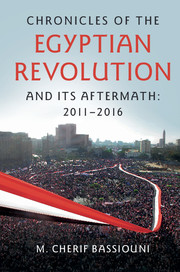Book contents
- Frontmatter
- Dedication
- Contents
- Preface
- Acknowledgments
- List of Abbreviations
- Introduction
- 1 The Early Stage of the Revolution
- 2 Mubarak Relinquishes the Presidency and the SCAF Assumes Power
- 3 A Prelude to Democracy: 2011–2012 Elections
- 4 The Morsi Presidency: June 30, 2012 to July 3, 2013
- 5 The Military's Return to Power and the El-Sisi Presidency
- 6 2015Legislative Elections and the Changing Civilian Political Landscape
- 7 The Military Institution: Its Power, Influence, and Culture
- 8 Violence and Repression
- 9 The Accountability Gap
- 10 The Justice System in Crisis
- 11 The Constitutional Quagmire
- 12 Demographics, Education, and the Economy
- 13 Geopolitical Factors
- 14 Concluding Assessment
- Pictures of the Egyptian Revolution and Related Events
- Bibliography
- Index
14 - Concluding Assessment
Published online by Cambridge University Press: 24 November 2016
- Frontmatter
- Dedication
- Contents
- Preface
- Acknowledgments
- List of Abbreviations
- Introduction
- 1 The Early Stage of the Revolution
- 2 Mubarak Relinquishes the Presidency and the SCAF Assumes Power
- 3 A Prelude to Democracy: 2011–2012 Elections
- 4 The Morsi Presidency: June 30, 2012 to July 3, 2013
- 5 The Military's Return to Power and the El-Sisi Presidency
- 6 2015Legislative Elections and the Changing Civilian Political Landscape
- 7 The Military Institution: Its Power, Influence, and Culture
- 8 Violence and Repression
- 9 The Accountability Gap
- 10 The Justice System in Crisis
- 11 The Constitutional Quagmire
- 12 Demographics, Education, and the Economy
- 13 Geopolitical Factors
- 14 Concluding Assessment
- Pictures of the Egyptian Revolution and Related Events
- Bibliography
- Index
Summary
It was the best of times, it was the worst of times,
it was the age of wisdom, it was the age of foolishness,
it was the epoch of belief, it was the epoch of incredulity,
it was the season of Light, it was the season of Darkness,
it was the spring of hope,
it was the winter of despair,
we had everything before us, we had nothing before us,
we were all going direct to Heaven, we were all going direct the other way …
Written more than 150 years ago, Charles Dickens’ words could well describe the 2011 Revolution. At first the Revolution was a ushing spring, but it soon turned into a strong flow that swept aside the Mubarak regime and ushered in a transitional military takeover. That is when the revolutionary current weakened, diverted by the strong obstacles it encountered. As it weakened, the river became stagnant, and its once powerful flow fragmented into small pools. In time, its waters dissipated entirely leaving only a trace in the parched earth.
Egypt is shaped by its history, constrained by its present, and defined by its hopes for the future. Its history is more than the mere recounting of events by those who were part of it or those who attempted to reconstitute it later. What is left for posterity, particularly for those who were directly involved, is likely to be a collection of impressionistic sketches, blended in each person's mind as part of a canvas colored by many emotions. Over time, those who will write its history will reevaluate and reinterpret events in light of subsequent ones, newly discovered facts, and more sober critical analysis than what the present polarized environment will permit.
A revolution is not only a time for change, but a time to take sides; revolutions bring people together as much as they separate them. They test the will of those who struggle for change against those who oppose it. Revolutions are about people, their values, their commitment – and about the effectiveness of the tactics used by opposing sides.
- Type
- Chapter
- Information
- Publisher: Cambridge University PressPrint publication year: 2016



